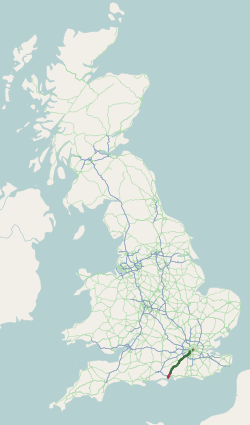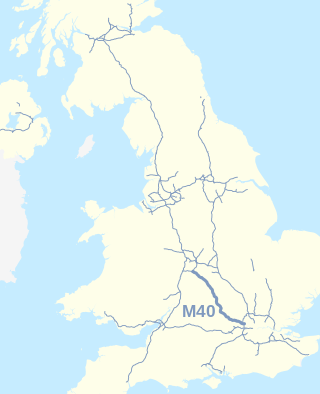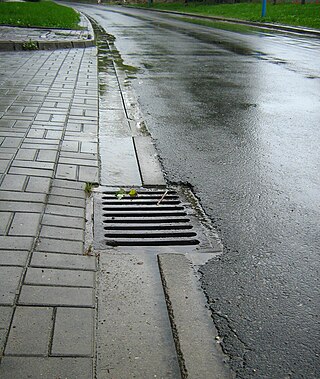
The M25 or London Orbital Motorway is a major road encircling most of Greater London. The 117-mile (188-kilometre) motorway is one of the most important roads in the UK and one of the busiest. Margaret Thatcher opened the final section in 1986, making the M25 the longest ring road in Europe upon opening. The Dartford Crossing completes the orbital route but is not classed as motorway; it is classed as a trunk road and designated as the A282. In some cases, including notable legal contexts such as the Communications Act 2003, the M25 is used as a de facto alternative boundary for Greater London.

The A3, known as the Portsmouth Road or London Road in sections, is a major road connecting the City of London and Portsmouth passing close to Kingston upon Thames, Guildford, Haslemere and Petersfield. For much of its 67-mile (108 km) length, it is classified as a trunk road and therefore managed by National Highways. Almost all of the road has been built to dual carriageway standards or wider. Apart from bypass sections in London, the road travels in a southwest direction and, after Liss, south-southwest.

The M40 motorway links London, Oxford, and Birmingham in England, a distance of approximately 89 miles (143 km).

The M23 is a motorway in the United Kingdom, running from the south of Hooley in Surrey, where it splits from the A23, to Pease Pottage, south of Crawley in West Sussex where it rejoins the A23. The northern end of the motorway starts on what is effectively a 2-mile (3.2 km) spur north of junction 7 of the M25 motorway. From Hooley it runs for 17 miles (27 km) past Redhill, Gatwick Airport and Crawley. A spur runs from junction 9 to Gatwick Airport.

A storm drain, storm sewer, surface water drain/sewer, or stormwater drain is infrastructure designed to drain excess rain and ground water from impervious surfaces such as paved streets, car parks, parking lots, footpaths, sidewalks, and roofs. Storm drains vary in design from small residential dry wells to large municipal systems.

A swale is a shady spot, or a sunken or marshy place. In US usage in particular, it is a shallow channel with gently sloping sides. Such a swale may be either natural or human-made. Artificial swales are often infiltration basins, designed to manage water runoff, filter pollutants, and increase rainwater infiltration. Bioswales are swales that involve the inclusion of plants or vegetation in their construction, specifically.

Hopwood Park services is a motorway service station in Bromsgrove, Worcestershire, England situated off Junction 2 of the M42 motorway on the A441 road to Redditch south of Birmingham. It opened in August 1999. Services include a Shell Petrol Station, Waitrose, Starbucks Coffee, WHSmith, and KFC. Electric Vehicle charging is provided by Gridserve and Tesla.
The United States Environmental Protection Agency (EPA) Storm Water Management Model (SWMM) is a dynamic rainfall–runoff–subsurface runoff simulation model used for single-event to long-term (continuous) simulation of the surface/subsurface hydrology quantity and quality from primarily urban/suburban areas.

Rain gardens, also called bioretention facilities, are one of a variety of practices designed to increase rain runoff reabsorption by the soil. They can also be used to treat polluted stormwater runoff. Rain gardens are designed landscape sites that reduce the flow rate, total quantity, and pollutant load of runoff from impervious urban areas like roofs, driveways, walkways, parking lots, and compacted lawn areas. Rain gardens rely on plants and natural or engineered soil medium to retain stormwater and increase the lag time of infiltration, while remediating and filtering pollutants carried by urban runoff. Rain gardens provide a method to reuse and optimize any rain that falls, reducing or avoiding the need for additional irrigation. A benefit of planting rain gardens is the consequential decrease in ambient air and water temperature, a mitigation that is especially effective in urban areas containing an abundance of impervious surfaces that absorb heat in a phenomenon known as the heat-island effect.

Cullompton services is a motorway service station on the M5 motorway near Exeter. It is owned by Extra MSA. It has a McDonald's restaurant which is franchised and offers table service, a small WHSmith and a Costa Coffee which is owned by Moto Hospitality. There is also a Shell petrol station nearby.

Clacket Lane services is a motorway service station on the M25 motorway midway between junctions 5 and 6, in Surrey, United Kingdom, adjacent to the parish borders between Limpsfield, Surrey and Westerham, Kent, a small village and a town respectively.

Oxford services is a motorway service station next to junction 8A of the M40 motorway at Waterstock near Wheatley in Oxfordshire, several miles to the east of the city of Oxford. It is named after the nearby city of Oxford. The services are owned by Welcome Break and opened in the summer of 1998. It was the third of four service stations to open on the M40.

Sustainable drainage systems are a collection of water management practices that aim to align modern drainage systems with natural water processes and are part of a larger green infrastructure strategy. SuDS efforts make urban drainage systems more compatible with components of the natural water cycle such as storm surge overflows, soil percolation, and bio-filtration. These efforts hope to mitigate the effect human development has had or may have on the natural water cycle, particularly surface runoff and water pollution trends.

Motorway service areas (MSA) in the United Kingdom and Ireland, also known as services or service stations, are rest areas where drivers can leave a motorway to refuel/recharge, rest, eat and drink, shop or stay in an on-site overnight hotel. The vast majority of motorway services in the UK are owned by one of three companies: Moto, Welcome Break and Roadchef. Smaller operators include Extra, Westmorland and EG Group.

An infiltration basin is a form of engineered sump or percolation pond that is used to manage stormwater runoff, prevent flooding and downstream erosion, and improve water quality in an adjacent river, stream, lake or bay. It is essentially a shallow artificial pond that is designed to infiltrate stormwater through permeable soils into the groundwater aquifer. Infiltration basins do not release water except by infiltration, evaporation or emergency overflow during flood conditions.

A percolation trench, also called an infiltration trench, is a type of best management practice (BMP) that is used to manage stormwater runoff, prevent flooding and downstream erosion, and improve water quality in an adjacent river, stream, lake or bay. It is a shallow excavated trench filled with gravel or crushed stone that is designed to infiltrate stormwater though permeable soils into the groundwater aquifer.

Extra MSA Services Ltd is a company that operates nine motorway service stations in England, mainly on primary routes. It is based at Beaconsfield services, previously being in the centre of Lincoln. It is also known as Extra MSA Forecourts Ltd.

Beaconsfield services is a motorway service station on the M40 motorway in Beaconsfield in Buckinghamshire, England. It is operated by Extra, and opened on 17 March 2009. It is the fourth and most recent of the service areas to be built on the 89-mile motorway which links London, Oxford and Birmingham. At its opening, it was the largest motorway service area in the United Kingdom. The petrol station with 36 pumps is also the largest filling station in the country. Petrol stations are provided by Shell and a hotel is operated by Ibis Budget.

Water-sensitive urban design (WSUD) is a land planning and engineering design approach which integrates the urban water cycle, including stormwater, groundwater, and wastewater management and water supply, into urban design to minimise environmental degradation and improve aesthetic and recreational appeal. WSUD is a term used in the Middle East and Australia and is similar to low-impact development (LID), a term used in the United States; and Sustainable Drainage System (SuDS), a term used in the United Kingdom.

Skelton Lake services is a motorway service area operated by Extra, on the M1 motorway near Leeds, West Yorkshire, England. It is located on junction 45 of the motorway which also links into the A63. It lies on the south side of the motorway; however, the junction affords access to, and from, all directions.




















